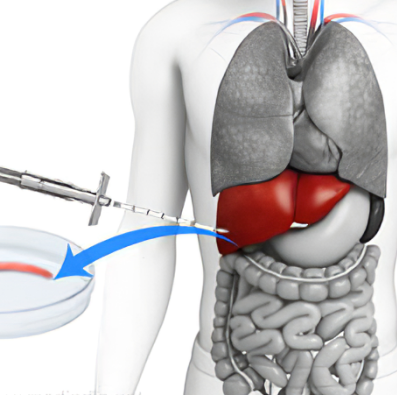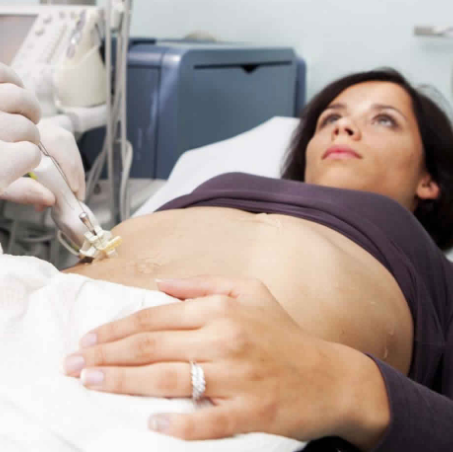What you need to know about Liver Biopsy
Contents
A liver biopsy is a medical procedure performed to collect a small piece of liver tissue, so it can be examined closely under a microscope for signs of disease or damage. This procedure is usually carried out to detect the presence of abnormal cells in the liver, such as cancer cells. Your doctor may suggest a liver biopsy if the result of your blood tests or imaging studies shows that you might have a problem in your liver. Although biopsies are usually associated with cancer, it does not necessarily mean that you have cancer if your doctor recommends this test.
A liver biopsy is most often used to:
-
Identify the cause of unexplained jaundice (yellowing of the skin), persistent abnormal liver blood tests (liver enzymes), a liver abnormality found on CT scan, ultrasound, or nuclear scan, as well as unexplained enlargement of the liver
-
Determine the severity of the liver disease
-
Grade and stage hepatitis B and C
-
Monitor the liver after a liver transplant
-
Help develop the best treatment for liver damage or disease.

What does the Procedure Involve?
Laparoscopic biopsy
Laparoscopic biopsy uses a laparoscope, which is a tube-like instrument with a tiny camera attached to it, to collect the sample.
Before the laparoscopic biopsy, you will be given a general anesthetic. Your doctor will create several tiny incisions in your abdomen. The laparoscope and special surgical tools are inserted through these incisions. The camera within the laparoscope projects images on a monitor. Your doctor uses these images to guide the surgical tools to your liver to take some tissue samples. When the samples are taken, the tools are removed and the incisions are closed with stitches.
Transjugular biopsy
To start the procedure, a small numbing medication is applied to one side of your neck. Your doctor will then create a small incision at the numbed area and then inserts a thin, flexible tube through the incision into your jugular vein. The tube is then guided through the jugular vein and into the hepatic vein (the large vein in your liver). Once the tube reaches your hepatic vein, your doctor will inject a contrast dye into the tube and creates a series of X-ray images. The contrast dye will show up in the vein, which enables your doctor to clearly see the hepatic vein. Afterward, a biopsy needle is inserted through the tube to take the liver sample.
Percutaneous biopsy
Percutaneous biopsy, also known as a needle biopsy, is the most common type of liver biopsy. It involves the use of a thin needle through your abdomen and into the liver. To start the procedure, your doctor will tap your abdomen or use ultrasound images to locate your liver. Ultrasound is sometimes used to guide the needle into the liver. Your doctor will apply a numbing medication and then creates an incision near the bottom of your ribcage. The needle is then inserted through the incision and your doctor will remove a small tissue sample.
How Long Should I Stay in the Area?
You can leave the hospital on the same day as the procedure. However, since it takes around a week until the result of your biopsy comes back from the pathology lab, plan to stay in the area for about 7 days. Once the result is ready, you will have to attend a follow-up appointment to discuss the results with your doctor. If everything is fine, you will be allowed to travel home afterward.
What’s the Recovery Time?
You need to take it easy and rest for at least 1 day. You should be able to resume your normal activities after a few days. However, avoid strenuous activities and heavy lifting for a week following your liver biopsy.
What About Aftercare?
Your doctor will give you detailed aftercare instructions that you need to follow. In general, you need to avoid taking aspirin or products that contain aspirin for a week. Your doctor will prescribe pain medication to help with your discomfort, make sure to take them as directed.
What’s the Success Rate?
A liver biopsy is a safe procedure with high success and accuracy rates. Although it is safe, there are still some possible risks and side effects that you will need to be aware of. These include:
-
Bleeding
-
Pain
-
Infection
-
Injury to a nearby organ.
A transjugular biopsy carries very rare risks of hematoma in the neck, puncture of the lung, temporary voice problems, and temporary problems with the facial nerves.
Are there Alternatives to a Liver Biopsy?
In some cases, your doctor may be able to make a diagnosis of liver disease based on physical examination, medical history, and blood testing. Doctors may also use imaging techniques as an alternative to liver biopsy. The simplest imaging technique that’s used is elastography (mostly known as FibroScan), which is similar to an ultrasound and can measure the stiffness of a liver.
What Should You Expect Before and After the Procedure
Before a liver biopsy, you may experience unexplained symptoms and your doctor may not be able to make an accurate diagnosis of your problem. After the procedure, your doctor should be able to make a diagnosis and know for sure the condition of your liver. The results will allow you and your doctor to create a treatment plan.
For an in-depth analysis of a Liver Biopsy Procedure, watch this short video.
To check prices or to book a Liver Biopsy Procedure, in Thailand or anywhere else in the world, head on over to MyMediTravel now!

